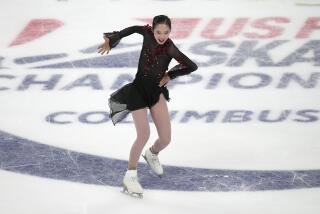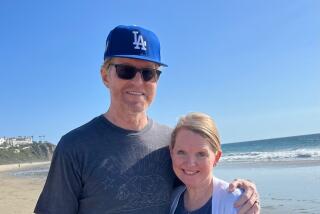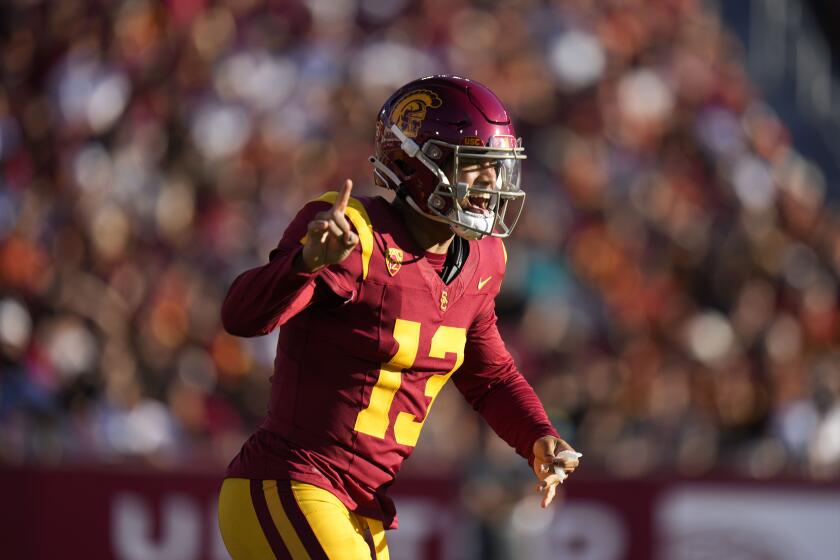Column:: Frank Carroll’s impact on figure skating continues in retirement
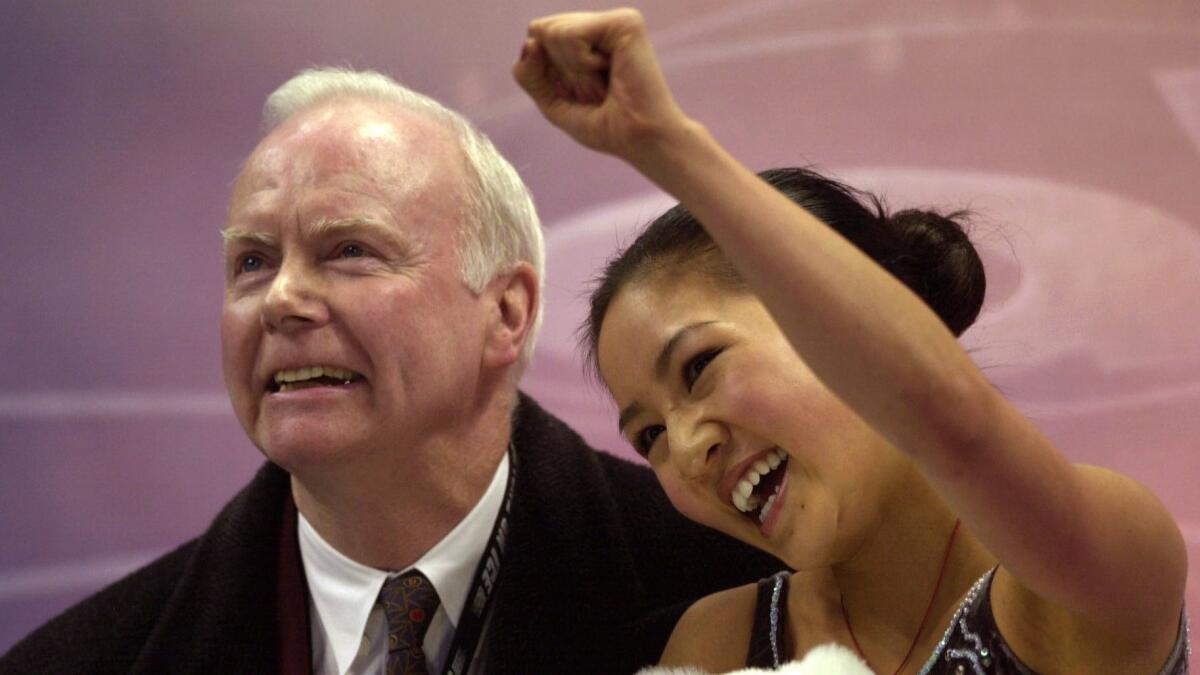
Skaters came and went, the perfect 6.0 score became history, and the artistry that made figure skating so compelling was slowly strangled by a scoring system that encouraged risky jumps in soul-stifling succession.
Through every era and rule change over more than 50 years, until he retired in August, a constant in the sport was that Frank Carroll coached champions here in Southern California.
Exacting but caring, he molded eager youngsters into polished performers who won national, world and Olympic titles. He helped turn Michelle Kwan, a tiny jumping prodigy from Torrance, into an incandescent star. He came as close as anyone to taming the infinitely talented but self-destructive Christopher Bowman.
He counts six Olympic medalists among his students, and he felt the same satisfaction coaching them as he did while coaching adults whose main ambition was simply to enjoy the sport. He nurtured the best in all of them, making them better than they knew they could be.
“Because of Frank, I am who I am today,” said Northridge’s Linda Fratianne, whose mesmerizing blend of athleticism and artistry brought her two world championships and a silver medal that should have been gold at the 1980 Lake Placid Olympics. “Because of him, I’ve learned how to treat people with respect and with love.”
Evan Lysacek, the 2010 men’s Olympic gold medalist, carries Carroll’s lessons in his heart, not just in muscle memory. “Some of the first things he taught me are some of the most important things that have stayed with me throughout my career in skating, for sure, but also in my life after skating,” Lysacek said.
An era ended in August when Carroll retired from coaching a month after he turned 80 and finished coaching at the summer skating school at Toyota Sports Center in El Segundo, his domain for most of the last two decades. The sport is less interesting without him standing at the boards watching his skaters float and fly, and without him telling stories dotted with hints of the Massachusetts accent he never lost.
A living link to the past is missing, someone dependable and solid. But for Carroll, tired of the travel and travails of coaching, the timing was right to step away and move full time to the Palm Springs home he has owned for 30 years.
“It feels great,” he said last week before the Kings honored him. He was the guest of honor at a pregame dinner at Staples Center and was joined by Kwan, Lysacek and Fratianne for a ceremonial puck drop.
“I love to watch it,” Carroll said of figure skating. “I put the TV on and watch the competitions and groan and moan about what’s happening to our sport. The rule changes are just horrendous. Because all it is, is moving your arms and legs and doing things, but there’s no real skating, beautiful skating anymore.”
He was always there, a father figure and somebody that you love so much.
— Michelle Kwan
Carroll learned his craft from Maribel Vinson Owen, who won more than a dozen U.S. singles and pairs titles in the 1920s and ‘30s and an Olympic bronze medal in 1932. Vinson Owen also coached 1956 Olympic gold medalist Tenley Albright. Vinson Owen and her two daughters, accomplished skaters, were killed in the plane crash that took the lives of the U.S. delegation to the 1961 World Championships.
Carroll became a coach by accident. He skated with the Ice Follies and came to California for law school but took a detour when a friend got him a coaching job in Van Nuys. Before he built his coaching resume, he made money by appearing in three beach blanket movies in the 1960s. He had no dialogue but his photograph was used on a promotional poster. “I was all spray-tanned and I had a surf board and bathing suit on,” said Carroll, who won’t reveal his stage name. “It was a really stupid, fun time in my life.”
Fratianne was his first Olympian in 1976, and she was favored to win in 1980. She was a much better skater than East Germany’s Anett Poetzsch, but Poetzsch built a huge lead in the compulsory figures phase, in which skaters traced patterns to demonstrate their control. Amid rumors of political deals among the judges, Fratianne finished second. “That was a really bad thing that happened in my life. I wanted to just not teach anymore,” Carroll said. “And then the next year I was at the junior world championship with Tiffany Chin and she won and Chuck DeMore, the president of U.S. Figure Skating, came up to me and said, ‘I thought you were quitting!’ ”
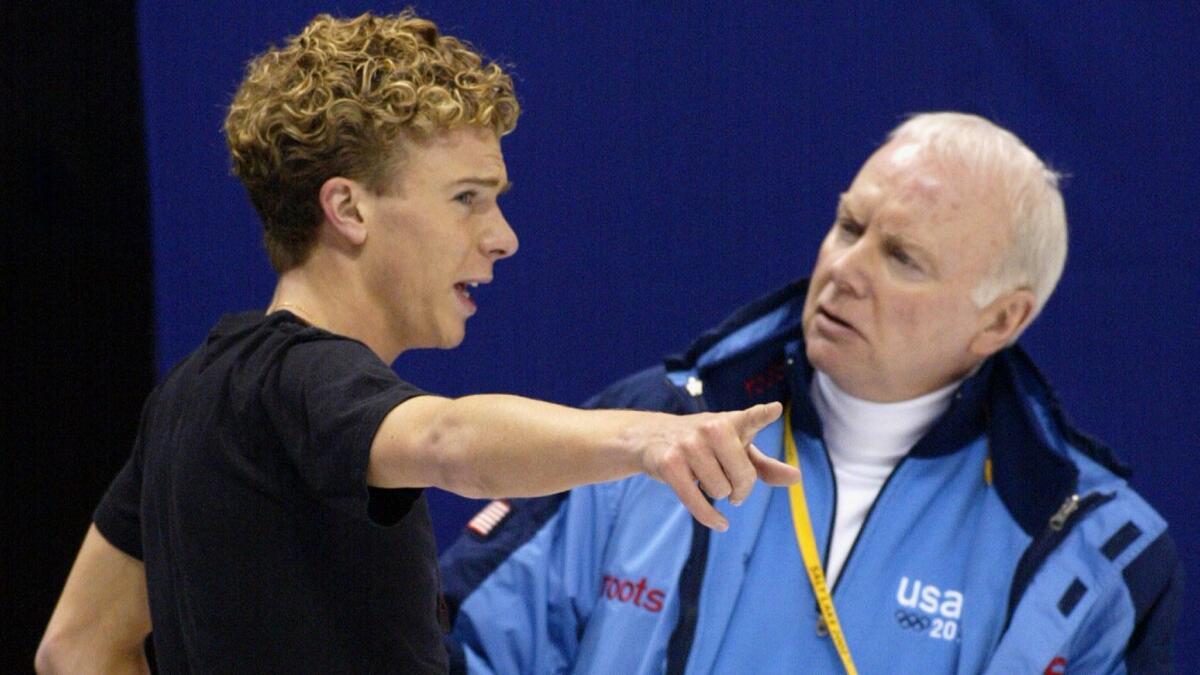
It was good fortune for him, for 2002 Olympic bronze medalist Tim Goebel, for Kwan and so many others that he didn’t quit.
Kwan, who won silver behind Tara Lipinski in 1998, shockingly dropped Carroll as her coach before the 2002 Games so she could take charge of her skating; whether she would have won gold instead of bronze in Salt Lake City if she’d stayed with him is an eternal topic of debate. Their relationship was cool for a while, but they reconciled.
“He was the most fantastic coach, person, friend,” Kwan said. “He’s so giving. It’s never about him. Over the years it’s always been all about making sure we’re OK, are you eating well, are you sleeping well. And I don’t remember, looking back at my career when we were working together, that he ever took a sick day. He was always there, a father figure and somebody that you love so much.”
His influence will last even though he’s not coaching. Fratianne and Chin coach in El Segundo, as does another of his former students, Bebe Liang. Others are coaching in other rinks, imparting the wisdom Carroll absorbed from Vinson Owen and passed along.
It’s their turn now to change careers and lives, as he did. “There will never be another Frank Carroll,” Fratianne said. “He is one in a billion.”
Follow Helene Elliott on Twitter @helenenothelen
More to Read
Get our high school sports newsletter
Prep Rally is devoted to the SoCal high school sports experience, bringing you scores, stories and a behind-the-scenes look at what makes prep sports so popular.
You may occasionally receive promotional content from the Los Angeles Times.
